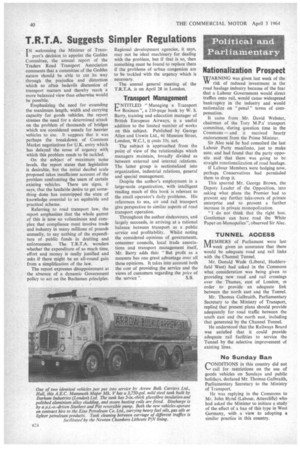T.R.T.A. Suggests Simpler Regulations
Page 42

If you've noticed an error in this article please click here to report it so we can fix it.
IN welcoming the Minister of Trans' port's decision to appoint the Geddes Committee, the annual report of the Traders Road Transport Association comments that a committee of the Geddes nature should be able to cut its way through the prejudice arid distortion which so often bedevils discussion of transport matters and thereby reach a more balanced view than otherwise would be possible. Emphasizing the need for extending the maximum length, width and carrying capacity for goods vehicles, the report stresses the need for a determined attack on the problem of thousands of bridges which are considered unsafe for heavier vehicles to use. It suggests that it was perhaps the breakdown of Common Market negotiations for U.K. entry which has delayed the sense of urgency with which this problem needs to be tackled. On the subject of maximum noise levels, the report states that legislation is desirable, but the initial decibel scale proposed takes insufficient account of the problem confronting the users of certain existing vehicles. There are signs, it says, that the laudable desire to get something done has Outstripped the state of knowledge essential to an equitable and practical scheme. Referring to road transport law, the report emphasizes that the whole gamut of this is now so voluminous and complex that compliance must involve trade and industry in many millions of pounds annually, to say nothing of the expenditure of public funds in drafting and enforcement. The T.R.T.A. wonders whether the expenditure of so much time, effort and money is really justified and asks if there might be an all-round gain from a simplification of the law.
The report expresses disappointment at the absence of a dynamic Government policy to act on the Buchanan principles.
Regional development agencies, it says, may not be ideal machinery for dealing with the problem, but if that is so, then something must be found to replace them if the problems of urban congestion are to be tackled • with the urgency which is necessary. The annual general meeting of the T.R.T.A. is on April 28 in London.
Transport Management ENTITLED "Managing a Transport 1-.-4 Business ", a 210-page book by W. S. Barry, training and education manager of British European Airways, is a useful addition to the limited number of works on this subject. Published by George .Allen and Unwin Ltd., 40 Museum Street, London, W.C.1, it costs 35s. net. The subject is approached from the point of view of the relationships which managers maintain, broadly divided as between external and internal relations. The latter group is sectionalized into organization, industrial relations, general and special management. Despite the author's employment in a large-scale organization, with intelligent reading much of this book is relevant to the small operator's daily problems. His references to sea, air and rail transport give perspective to similar aspects of road transport operation. Throughout the author endeavours, and largely succeeds, in arriving at a rational balance between transport as a public service and profitability. Whilst noting the considered .opinions of governments, consumer councils, local trade associations and transport management itself, Mr. Barry adds this: "But profit as a measure has one great advantage over all these opinions. It takes into account both the cost of providing the service and the views of customers regarding the price of the service ". S. B.












































































































































